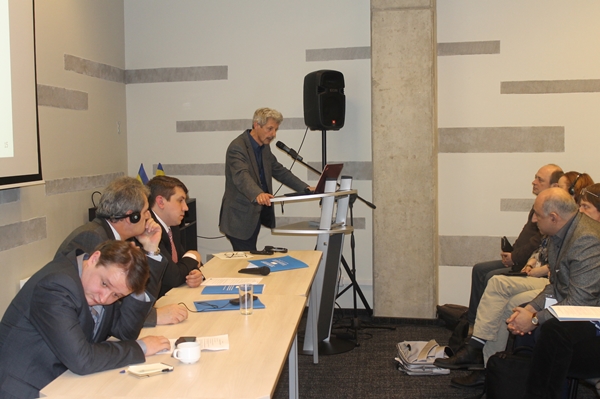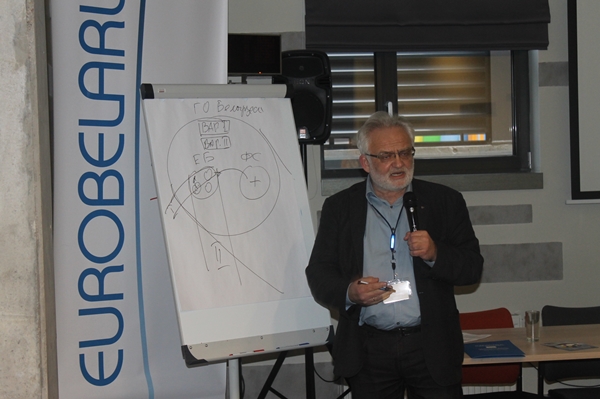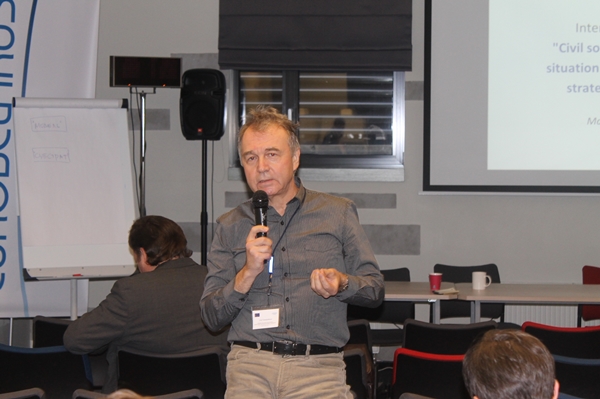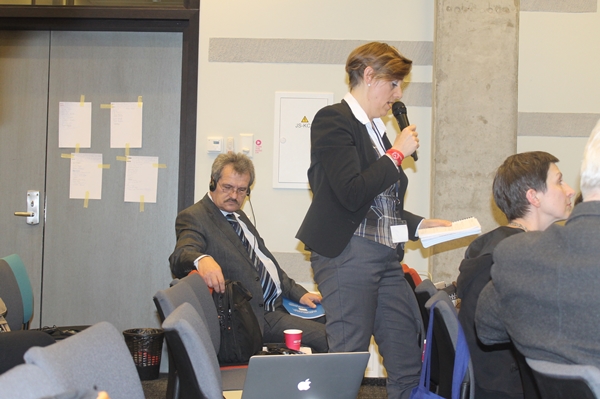The Belarusan National Platform of the EaP CSF issued a statement in connection with the wave of searches in the editorial offices of the Belarusan media and the detention of journalists.
Regional development strategy — debates and doubts: “Here and now” or strategy of changes?

At the international conference “Civil society: analysis of the situation, approaches and development strategies” the participants are stating: over the last decade general situation with the civil society development has vividly worsened.
Summing up the results of discussion about the further development of the civil society at local level, Andrei Yahorau, the director of the Centre for European Transformation, specifies the key points of disagreement:
“We put forward the “Principle of Yury Voronezhtsev-Uladzimir Matskevich”, which claims that any strategy of development at local level aims at the development of the civil society, even if the organization implements some actions to improve the lives of the communities.”
However, according to Miraslau Kobasa, the chairman of the Enlightenment Public Association “Lew Sapieha Foundation”, “Being aware and sharing our aim which is to develop the civil society, in certain cases to improve some specific points in the lives of communities we have to cooperate with the authorities.” Kobasa assumes that it would be harmful to ignore the available opportunities.
The participants of the discussion noted that on local level there exist different strategic levels of action: it is both cooperation of different players towards Belarus’ regional development and concrete local actions at the regional level.
As to the “Principle of Yury Voronezhtsev-Uladzimir Matskevich”, which prioritizes civil society development, we can draw a conclusion that “some players and action strategies which can do harm to the civil society development”. At this point Robin van de Paul from Nehem International made an objection, saying that “without knowing the general action strategy and its goals we can’t say what is harmful and what is not at the moment. We shouldn’t jump to conclusions.”
Piotr Kuzniatsou, the head of the civil initiative “Gomel Democratic Forum”, mentioned the model of regional development, which can be described in the following way
“We could treat the development of the civil society at local level so that every region would embody the full model of some group, which is responsible for the development of the region. This model has to contain at least four parts: 1) analytical work at local level; 2) the presence of personal media; 3) the presence of strategic goals and guidelines; 4) activity in accordance with these goals and guidelines. This model has to be implemented in each region; but it can only be implemented when there are regional groups and development grounds, which can further the realization of the model.”
At the same time in Belarus different players are trying to implement different uncoordinated lines of development at one and the same territory. That is why Antonella Valmorbida (The Association of Local Democracy Agencies) notes:
“If different players act on the same territory in order to reach regional development, they are to coordinate their actions, or, at least, take into account the scenarios implemented on this territory. Otherwise they will disturb, counteract and contradict each other.”
Her second point says that the downside of each activity implemented at local level and aimed at civil society development is participation, cooperation and development of local regional authorities. But without it no fully-fledged regional development is possible.
The counter-evidence of philosopher and methodologist Uladzimir Matskevich is that “Belarusan governing bodies are structured in such a way that they can deceive any developers of local communities, taking away people’s activities and resources and ignoring any movement towards European values and ideals.”
Others
-
Statement of the Belarusan EaP CSF National Platform on solidarity with the civil society of Armenia
The Belarusan National Platform of the Eastern Partnership Civil Society Forum issued a statement on solidarity with the civil society of Armenia.
-
Statement of the BNP in connection with the criminal prosecution of the leaders of the Belarusan independent trade unions
The Belarusan National Platform of the Eastern Partnership Civil Society Forum issued a statement in connection with the criminal prosecution of the leaders of the Belarusan independent trade unions.
-
Final event of project CHOICE — Paving the way to European Year of Cultural Heritage 2018
The final event of the two-year EU funded project CHOICE — Cultural Heritage: Opportunity for Improving Civic Engagement was held on June 6, 2017 at the Committee of the Regions, in Brussels.
-
Heritage is a verb. The results of the CHOICE project were summarized in Minsk (Photos and video)
Does Belarus need a “Public Ministry of Culture” and “Ašmiany Charter” to deal with the historical and cultural sites?












Comments
From farewell to a new Eastern policy and towards a new development
Poland and Germany were both initiators and drivers of a New Eastern policy linked to the Eastern neighborhood and Russia/Soviet Union.